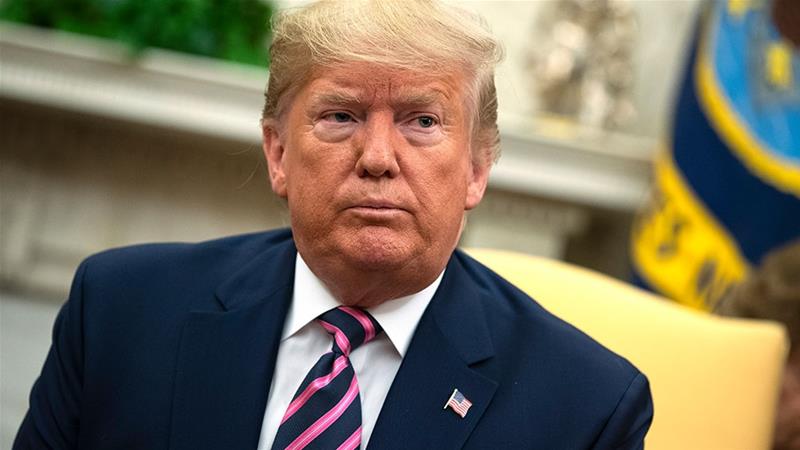Trump impeachment vote: US House panel to set debate rules
Democrats, Republicans to decide how much time will be set aside for debate for Wednesday’s historic impeachment vote.
WHAT IS IMPEACHMENT?
- The founders of the United States included impeachment in the US Constitution as an option for removal of presidents by Congress.
- They agreed that presidents could be removed if found guilty by Congress of “treason, bribery or other high crimes and misdemeanors”.
Democrats and Republicans will grapple on Tuesday over the rules of engagement for a historic vote this week in the United States House of Representatives, where President Donald Trump is likely to become the third US president to be impeached.
In what is widely expected to be a marathon meeting, the House Rules Committee will decide how much time to set aside for debate on Wednesday before politicians vote on two articles of impeachment charging Trump with abuse of power and obstruction of Congress over his dealings with Ukraine.
More:
-
Trump impeachment vote: What happens next?
-
In 650-page impeachment report, Democrats say Trump betrayed US
-
Trump impeachment: Committee sends charges to full House for vote
The looming vote promises to bring a raucous, partisan conclusion to a months-long impeachment inquiry against the Republican president, which has bitterly divided the American public as voters prepare for next year’s presidential and congressional elections.
The Democratic-controlled House is expected to approve the impeachment articles largely along partisan lines. The action then moves to the Republican-controlled Senate, where the effort to remove Trump from office faces long odds.
Democrats accuse Trump of pressuring Ukraine to open an investigation into the president’s political rival and former vice president, Joe Biden, who is also a frontrunner in the 2020 Democratic presidential race. They also charge that the president obstructed their investigation by refusing to comply with subpoenas and directing members of his administration to do the same.
The impeachment inquiry, launched in September following a whistle-blower complaint, was centred on a July 25 phone call during which Trump asked Ukrainian President Volodymyr Zelenskyy to open an investigation into Biden and his son, Hunter, who had served on the board of a Ukrainian gas company. There has been no evidence of wrongdoing by the Bidens.
Trump also wanted Zelenskyy to investigate a debunked conspiracy theory that Ukraine, not Russia, interfered in the 2016 US presidential election.
At the time of the call, the Trump administration was withholding nearly $400m in Congress-approved military assistance from Ukraine.
Trump denies wrongdoing and has accused Democrats of conducting a “sham” impeachment to remove him from office.
The 13-member Rules Committee will hear testimony from House Judiciary Committee Chairman Jerrold Nadler, whose panel drafted the impeachment articles and approved them along party lines last week. The panel’s top Republican, Representative Doug Collins, also will testify.
Politicians are also expected to offer amendments at the meeting, which could run for 12 hours or more depending on how many of the House’s 431 sitting legislators decide to show up and speak.
In the end, the committee will set the rules for the floor debate that will precede the impeachment vote.
Looming Senate trial
The final House vote is expected to fall largely along party lines. Several Democrats from districts that backed Trump in 2016 said on Monday they would vote to impeach him.
“I will vote yes, knowing full well the Senate will likely acquit the president in a display of partisan theatre that Republicans and Democrats in Washington, DC, perform disturbingly well,” Democratic Representative Ben McAdams of Utah said in a statement.
Trump will be on friendlier terrain in the Senate, which is expected to consider the charges in January.
Republicans hold 53 of the Senate’s 100 seats, and at least 20 of them would have to vote to convict Trump to clear the two-thirds majority required to remove Trump from office. No Republicans have indicated they may do so.
Senate Democratic leader Chuck Schumer said he wanted the trial to consider documents and hear testimony from four witnesses, including acting White House Chief of Staff Mick Mulvaney and Trump’s former national security adviser John Bolton, saying testimony could sway Republicans in favour of impeachment.
Senate Republican leader Mitch McConnell has suggested the chamber could move quickly to a vote without hearing from witnesses after House Democrats and the White House make their presentations.
On Wednesday, McConnell appeared to reject the Democrats’ request for new witnesses, saying “if House Democrats’ case is this deficient, this thin, the answer is not for the judge and jury to cure it here in the Senate”.
Trump, however, has said he would like a robust trial with a number of witnesses, including the Bidens and the whistle-blower, whose complaint led to the impeachment inquiry.
Source: Read Full Article




